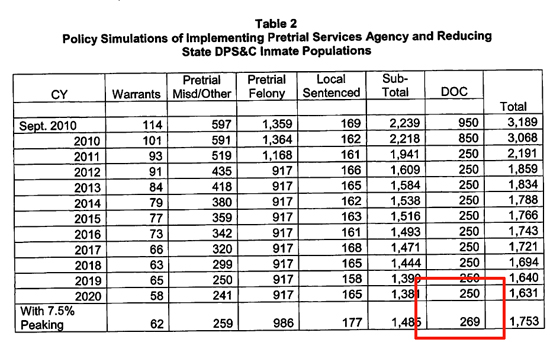By Matt Davis, The Lens staff writer.
Mayor Mitch Landrieu said today the total number of beds in a new jail is still up for debate, despite a firm recommendation for a specific size from a working group run by his chief aide.
Landrieu established the working group in September to examine the impact of various policy changes on the projected number of jail beds. Chief Administrative Officer Andy Kopplin chaired the group and led a “yes” vote on a Nov. 23 resolution to recommend a total number of 1,438 city beds by 2020.
The 1,438-bed number was based on research led by James Austin, a criminal-justice consultant working with the National Institute of Justice.
But Orleans Parish Sheriff Marlin Gusman said Tuesday he needs 1,800 more beds than the 1,438-bed facility recommended by the working group, a total of about 3,200 beds.
Landrieu did not dispute Gusman’s 3,200-bed number at a press conference today, saying only there will need to be more than 1,438 beds.
“At this point in time, everybody is in agreement that we need to build a new facility now, and the size of that facility should be 1,438 beds,” Landrieu said. “The report (from the working group) also said, however, that there is going to be a need for more beds, and how many that is, and what that looks like, and whether that includes education, substance abuse, mental health, is a matter that needs to be discussed over the next couple of months.”
In fact, Austin’s study said the number of state prisoners could be reduced from 950 to 250 by 2020.
The working group will continue to meet for three more months to discuss other policy changes, such as housing fewer state prisoners, although a date has not been set for the group’s next meeting.
Landrieu also hinted this morning that 3,200 total beds might be an appropriate number, comparing it to the total number of jail beds in the city before Hurricane Katrina.
“Before Katrina we had an excess of 7,000 beds, so even 3,200, if it were the number – and I’m not saying that it is – is half of what it was, in order to put it in appropriate proportion for the city,” Landrieu said.
On Nov. 23, Gusman convinced the group to back down from forcing him to demolish his existing jail facilities once the new 1,438-bed jail is built.
Gusman is already building an $11-million, 400-bed temporary jail, which he says will be demolished when the new facilities open in 2013.
If Gusman had 1,800 more beds, he might be able to house 1,800 more state prisoners because the City Council has no legal authority to control how many state prisoners Gusman houses, beyond its power to grant construction permits.
The only control the council has is in placing conditions on the building permit. Once it’s issued, the sheriff has sole power over his operation.
Gusman told The Lens in September that it’s up to the state how many state prisoners are housed locally, but the state said Gusman can keep as many state prisoners as he has room for.
Gusman has increasingly relied on revenues from the state to fund his operations over the past three years, and his jail holds more state prisoners than any other parish facility in Louisiana. His state revenue has risen by more than 60 percent in three years from $6.9 million in 2009 to $11.1 million predicted in 2011. Meanwhile, the city is actually slated to give Gusman less money in 2011 than it did last year.
Landrieu said the group will need to consider pre-trial investigations, police arrest powers, and the number of state beds in Gusman’s jail before deciding on the total number of beds at the new jail. But he also had strong words for advocates for a smaller jail.
“And of course it’s always a moving target,” Landrieu said. “Sometimes advocates have a tendency to be a little bit zealous, and want to get to a point quicker without thinking about who’s responsible for actually keeping the streets safe.”


